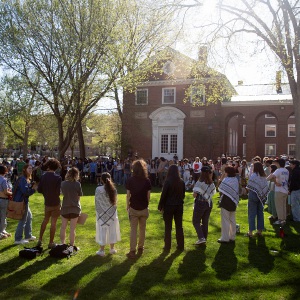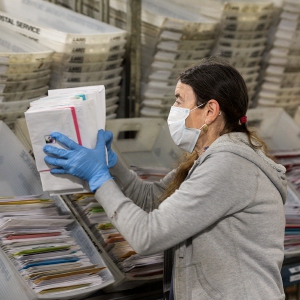‘Bigger than before’: New Hampshire Black Lives Matter chapters merge
| Published: 10-03-2023 8:18 AM |
The state’s three Black Lives Matter chapters are merging to form a single statewide nonprofit: Black Lives Matter New Hampshire.
The consolidation, leaders say, will allow the organization to build its collective power, as well as boost organizing and outreach efforts throughout New Hampshire. The chapters in Manchester, Nashua, and the Seacoast region have already been frequent collaborators and share much of the same mission, though there are nuances in their different communities.
“The message is that we’re still here and we’re now bigger than before,” said Tanisha Johnson, of Exeter, co-founder and board chair of Black Lives Matter Seacoast. “We’re still working on causes in a greater demand and the initiatives are not just when something happens and we’re being reactive about it. We are taking a proactive approach, and now we’re doing that statewide.”
Ronelle Tshiela, who co-founded Black Lives Matter Manchester and served on the state’s Commission on Law Enforcement Accountability, Community, and Transparency, said the chapters’ work has shifted since 2020, when organizers across the country took to the streets in protest after the murder of George Floyd in Minneapolis.
Black Lives Matter was front and center in political conversations then. In June 2020, Black Lives Matter Manchester, Nashua, and Seacoast put out seven demands for gubernatorial candidates in response to the killing of Floyd. Those included requiring implicit bias training for all state and government employees, creating a new racial equity task force, and prohibiting the use of rubber bullets and tear gas by police.
In 2021, the chapters were also active in advocating against the “divisive concepts” bill that is now state law, as well as legislation they deemed “anti-bail reform” that could disproportionately impact people of color.
More recently, Tshiela said, the chapters are shifting their focus to real-time community needs, rather than testifying at the State House, for example, which used to be at the forefront of their mission.
Those more immediate needs include youth education and scholarships, Black maternal health, diversity and inclusion training, and mutual aid support for people of color.
Article continues after...
Yesterday's Most Read Articles
 Dartmouth administration faces fierce criticism over protest arrests
Dartmouth administration faces fierce criticism over protest arrests
 West Lebanon crash
West Lebanon crash
 Plan on track to ship Upper Valley mail to Connecticut for sorting
Plan on track to ship Upper Valley mail to Connecticut for sorting
 Lebanon’s Jewell back from auto accident, more aware of ‘drowsy driving’ dangers
Lebanon’s Jewell back from auto accident, more aware of ‘drowsy driving’ dangers
 Longtime employees buy West Lebanon pizzeria
Longtime employees buy West Lebanon pizzeria
They’re also celebrating Black joy and success, too, and creating gathering spaces for communities. The Seacoast chapter holds an annual Black Excellence Gala and a Black Excellence Weekend at the University of New Hampshire, where they honor award winners in business, art, community impact, and academics.
“I think people still want that energy from 2020 to continue, and they still want these Black organizations to thrive and for Black people to have these spaces where they feel valued,” said Clifton West. Jr., of Barrington, executive director and co-founder of Black Lives Matter Seacoast. “We definitely still get that feeling. It’s still needed.”
Discussions about merging the chapters began last winter. Logistically, Black Lives Matter Seacoast, a standalone registered nonprofit that formed in the summer of 2020, is changing its name to Black Lives Matter New Hampshire. Their work is funded entirely by grants and donations.
“Talking to the other leaders, it was just like, now is the perfect time,” said West Jr.
The chapter leaders said while there are certainly differences among their communities – from demographics to geographic location to socioeconomic status – they were doing much of the same work with aligning missions.
Tshiela sees the merger as cementing the longevity of a movement she helped launch in New Hampshire back in 2016, as a teenager in the state’s largest city.
“It also means this is an opportunity to make it even more sustainable and make sure it lasts beyond our involvement in the organization,” she said.
Johnson is most excited about expanding the organization’s board, seeing it double in size to include members “from across the state with new perspectives and thoughts.”
Mutual aid has become a staple of the Black Lives Matter movement in New Hampshire, and the demand for assistance is expected to grow as the new statewide organization expands its reach. Mutual aid, Johnson described, is funding given to those in need “without any question, without any barriers or restrictions.”
Both the Seacoast and Manchester chapters have robust mutual aid programs. Last year, the Seacoast chapter doled out more than $60,000 to help neighbors with everyday needs across Strafford and Rockingham counties in New Hampshire, York County in Maine, and Essex County in Massachusetts.
Manchester’s mutual aid relief fund primarily helps Black households in the city who need help paying utility or wifi bills, rent, or car payments.
To meet the expected increase in mutual aid fund requests, West Jr. said the new organization will launch with a monthly donor drive – if they gain 50 new monthly donors, the Resource Organizing Project will provide a $5,000 match.
Black Lives Matter New Hampshire anticipates expanding its youth division, which connects biweekly to discuss current events, personal lives, and create safe spaces for youth. Participants have, for example, addressed a lack of inclusion and equity within libraries for youth, held supply drives and created fun social spaces, and served as a resource for students looking to have their voices heard by administrators and teachers.
Initiatives around Black maternal health are also expected to be a major focus. The U.S. maternal mortality rate has gotten worse in recent years, and according to a study published in the Journal of the American Medical Association, maternal death rates remain the highest among Black women.
Last April, Black Lives Matter Seacoast, Reproductive Freedom Fund of New Hampshire, and Lovering Health Center held an event at UNH titled, “Beyond Roe: Black Abortion and Maternal Health Experiences.”
Tshiela was a panelist and Johnson moderated the event, which featured a keynote speech from Dr. Ndidiamaka Amutah-Onukagha, the Julia A. Okoro Professor of Black Maternal Health in the Department of Public Health and Community Medicine at Tufts University School of Medicine and founder of the Center for Black Maternal Health and Reproductive Justice.
“One of the new ventures we are really working towards is programming in regards to Black maternal health and resources,” Johnson said.


